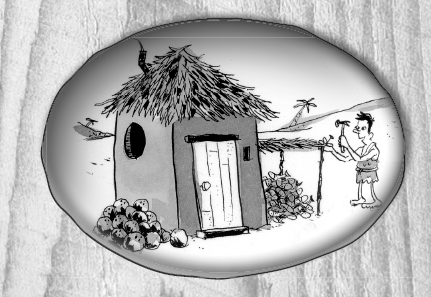
After a few weeks, Able, Baker and Charlie had been raking in the fish with their newly built nets, and a two fish-per-day catch became the norm. Since each only needed to consume one fish per day, the island's supply of savings quickly began to swell. Though every so often they decided to splurge and eat two fish in a single day, for the most part they were far more prudent with their catch.
Released from the need to fish every waking moment, the islanders finally had the freedom to undertake other productive and enjoyable activities. Able was able to devote some time to designing and constructing more functional—and more flattering—palm-leaf clothing. Baker expanded his diet and culinary skills by gathering coconuts, and Charlie built the island's first hut.
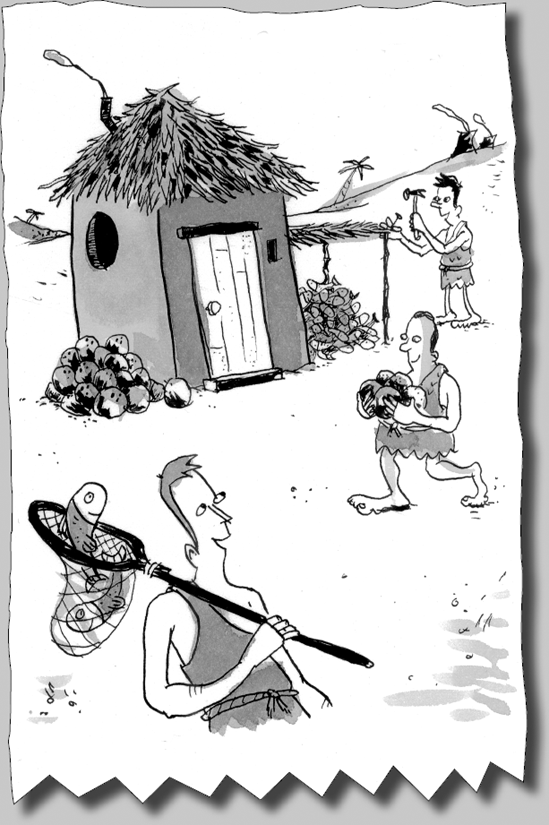
Things were going well, but Baker was convinced they could be even better. He said, "If we can expand production with hand nets, why not kick it up a notch and go industrial?" He envisioned a larger and better piece of capital equipment.
He sketched out the plans for an elaborate fish-catching device that would revolutionize the island's economy. The gizmo involved a huge underwater trap with one-way doors that could catch fish continually day or night. That's right—fish check in, but they don't check out. If it worked, they would never have to fish again!
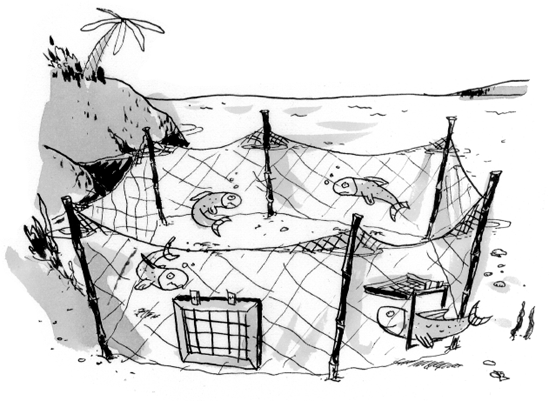
But, Baker soon realized that the he was unable to handle such a complex project by himself. He thought about the materials necessary, the netting, the framework, the construction. His savings, brawn, and ingenuity were simply not enough for such a colossal project.
With these thoughts in mind, Baker decided to propose a joint venture. The three could form a company, under-consume for a while, pool their savings, and dedicate an entire week to construction.
Having listened to Baker's plan, they began to discuss the potential risks. As with Able's first net, there was no guarantee that the project would work. Even if it did, the whole contraption could fall apart in its first exposure to rough seas. But this time it wasn't just one fish they were risking, but more than 20!
However, their demand for more fish overpowered their fear of losing their savings.
They moved forward.
After a supreme effort, the three succeeded in building the island's first mega fish catcher. The trap delivered as advertised and racked up an average of 30 fish per week, with no fuss and barely any muss. Outside of some minor repairs and maintenance, the trap was almost entirely automated. Soon they were swimming in fish.
With the savings that quickly piled up due to this latest advancement in productivity, the three soon built another mega fish catcher.
Fish became so abundant that they were able to dedicate all their time to other projects.
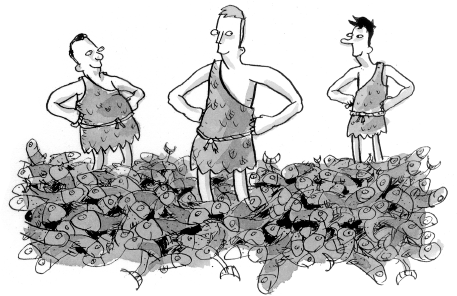
Charlie used his savings to build surfboards, resulting in a new ultracool leisure activity.
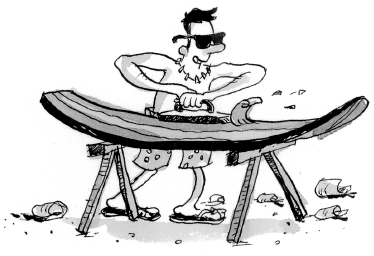
Able used his savings to establish a clothing company that would produce items not just for himself but for any islander who wanted to freshen up their image. In his spare time, he began working on his one-man stage play.
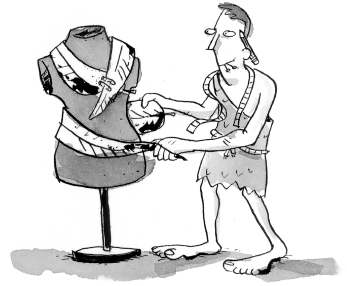
For his part, Baker used his free time to focus on the island's vexing transportation problems, and developed designs for the island's first canoe and cart.
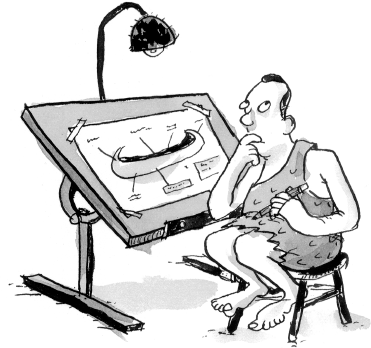
In the past, the United States was known as a nation of savers. Throughout much of our history American citizens typically saved 10 percent or more of their incomes annually. This discipline not only helped build a huge supply of savings to finance our growing industrial activity, but it also helped families and communities endure unexpected hardships.
However, in recent years, economists have severely downgraded savings on the economic value chain. Keynesians view savings as detrimental to growth because the act removes money from circulation and decreases spending (which they assume is the crucial element in creating economic growth). Policy makers, influenced by these ideas, have made rules that reward spenders and penalize savers.
As a result, Americans have, for years, spent more than we have earned. In a contained economy, like an island, this would be impossible. But in our modern world, the flow of money across borders and the seemingly magical qualities of the printing press have temporarily blinded many Americans to the simple truth that we can't consume more than we produce, or borrow more than we save ... at least not for very long.
When the economic headwinds began to pick up in earnest in 2008, politicians and economists reflexively looked for a means to get consumers to spend even more and save even less.
They have it backward. Spending for its own sake means nothing. What if you spent $1 million, but bought nothing but air? How would this benefit society? It would surely benefit the person who sold you the air. He would get the million dollars formerly belonging to you. Using our modern methods of economic accounting, such as the measurement of gross domestic product (GDP), the transaction would certainly look like genuine activity. It would be counted as $1 million worth of growth.
But the act of buying air does not improve the economy as a whole. The air was always there. the fact that someone spent money on it does not change a thing.
Spending is merely the yardstick that we use to measure production. Since everything that is produced will eventually be consumed, why does spending really matter? Even the stuff that no one really wants will be consumed if the price falls far enough. But nothing can be consumed until it is produced. It's production that adds the value.
Saving creates the capital that allows for the expansion of production. As a result, a dollar saved makes more of a positive economic impact than a dollar spent. Just don't try to explain this to an economist or a politician.
